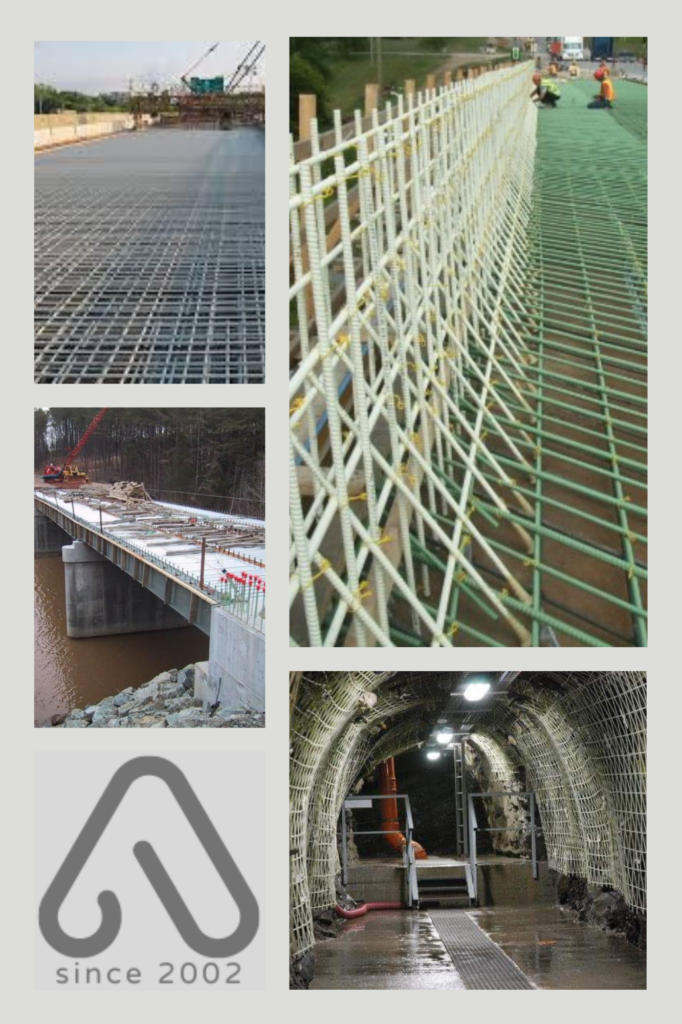Introduction
In the ever-evolving field of civil engineering, the materials used in construction play a crucial role in determining the durability, sustainability, and overall performance of structures. One innovative material that has gained significant attention recently is Glass Fiber fiber-reinforced polymer (GFRP) rebars. This article explores the advantages, applications, and prospects of GFRP rebars in road construction.
What are GFRP Rebars?
GFRP rebars are composite materials from a polymer matrix reinforced with glass fibers. Unlike traditional steel rebars, GFRP rebars are non-corrosive, lightweight, and possess high tensile strength. These properties make them an attractive alternative for various construction applications, particularly in corrosion-prone environments.
Advantages of GFRP Rebars in Road Construction
1. Corrosion Resistance
One of the most significant advantages of GFRP rebars is their resistance to corrosion. In road construction, exposure to de-icing salts, moisture, and other environmental factors can lead to the deterioration of steel rebars. GFRP rebars, being non-corrosive, ensure the longevity of road structures, reducing maintenance costs and extending service life.
2. Lightweight
GFRP rebars are significantly lighter than steel rebars, making them easier to handle and transport. This lightweight nature can lead to reduced labor costs and faster construction times, as fewer resources are required for installation.
3. High Strength-to-Weight Ratio
Despite their lightweight nature, GFRP rebars offer a high strength-to-weight ratio. This means that they can provide the necessary structural support without adding excessive weight to the road infrastructure. This property is particularly beneficial in applications where weight reduction is critical.
4. Enhanced Durability
GFRP rebars exhibit excellent durability under various environmental conditions. They are resistant to chemical attacks, UV radiation, and extreme temperatures, making them suitable for use in diverse climates and locations.
5. Sustainability
As the construction industry moves towards more sustainable practices, GFRP rebars present an eco-friendly alternative. They are made from recyclable materials and can contribute to the overall sustainability of road construction projects.
Applications of GFRP Rebars in Road Construction
1. Bridge Decks
GFRP rebars are increasingly being used in the construction of bridge decks. Their corrosion resistance and lightweight properties make them ideal for this application, where exposure to moisture and de-icing salts is common.
2. Pavements
In pavement construction, GFRP rebars can enhance the structural integrity of the pavement while reducing the risk of cracking and deformation. Their use can lead to longer-lasting pavements with lower maintenance requirements.
3. Retaining Walls
GFRP rebars are also suitable for use in retaining walls, where they can provide the necessary support without the risk of corrosion. This application is particularly beneficial in areas with high moisture levels.
4. Overlay Systems
GFRP rebars can be utilized in overlay systems for existing roads, providing additional strength and durability without the need for extensive reconstruction. This application can extend the life of aging roadways.
Challenges and Considerations
While GFRP rebars offer numerous advantages, there are also challenges to consider. The initial cost of GFRP rebars can seem more than traditional steel rebars. But the weight is much lower than steel and its anti-corrosion has saved transportation, implementation, and costs associated with reducing maintenance and increasing the life of the structure, which has made this type of rebar popular.
Additionally, the design and engineering of structures using GFRP rebars require specialized knowledge and expertise. Engineers must be familiar with the unique properties of GFRP materials to ensure optimal performance in road construction.
Future Prospects
The future of GFRP rebars in road construction looks promising. As technology advances and more research is conducted, the applications and benefits of GFRP materials are expected to expand. Increased awareness of the advantages of GFRP rebars among engineers and construction professionals will likely lead to wider adoption in the industry.
Conclusion
In conclusion, GFRP rebars represent a significant advancement in road construction materials. Their corrosion resistance, lightweight nature, high strength-to-weight ratio, and sustainability make them an attractive alternative to traditional steel rebars. As the construction industry continues to evolve, GFRP rebars are poised to play a crucial role in the development of durable and sustainable road infrastructure. Embracing this innovative material can lead to safer, longer-lasting roads that meet the demands of modern transportation.
Call to Action
If you are involved in road construction or civil engineering, consider exploring the benefits of GFRP rebars for your next project. Stay ahead of the curve by incorporating innovative materials that enhance the durability and sustainability of your infrastructure.
